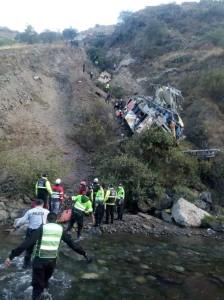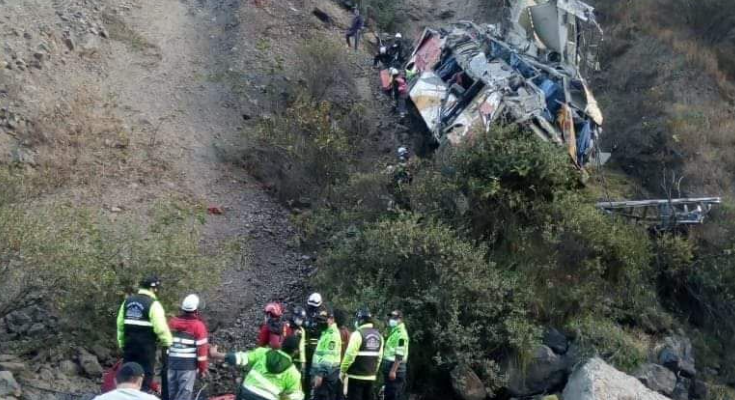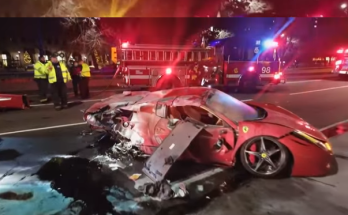The Long Road Down
The bus left Potosí just after dawn, winding through the high-altitude roads of southern Bolivia. It was a battered blue coach, its paint faded by sun and dust, its engine coughing through the thin mountain air. Inside were 46 passengers — farmers, students, vendors, and a few tourists — all bound for the town of Tupiza, nestled in the Andean valleys.
Among them was Lucía Ortega, 19, traveling home after her first semester at university. She sat by the window, her backpack tucked beneath her feet, her fingers tracing the outline of a letter she hadn’t yet sent to her mother. It was a letter full of dreams — of becoming a teacher, of building a life beyond the hills.
She never got to send it.
🕯️ The Fall
At 10:42 a.m., the bus approached a curve known locally as “La Boca del Diablo” — the Devil’s Mouth. It was a notorious bend, carved into the cliffside with no guardrails and a sheer drop of over 200 meters. Drivers slowed here. Locals prayed.
But that morning, something went wrong.
Witnesses from a trailing truck said the bus swerved suddenly, as if avoiding something — a rock, a pothole, a shadow. Then it tilted. Then it vanished.
The sound of metal tearing through air echoed across the valley. Dust rose like smoke. And silence followed.
🚨 The Rescue
It took hours for emergency crews to reach the site. The terrain was unforgiving — jagged rocks, loose soil, and a descent that tested every step. Helicopters hovered overhead, lowering medics on cables. Volunteers formed chains to pass stretchers and supplies.
The wreckage was unrecognizable. The bus had shattered on impact, its frame twisted like wire, its seats scattered like bones. Bodies lay among the debris — some still, some breathing, some calling out.
Lucía was found beneath a collapsed panel, her pulse faint, her eyes closed. She was one of the few pulled out alive.
But 31 others were not so lucky.
🧠 The Shockwave
News spread quickly. Radios crackled with updates. Social media filled with names, photos, prayers. Families gathered at hospitals, clutching ID cards and hope. The government declared a day of mourning. Flags were lowered. Candles were lit.
In Potosí, the university held a vigil for Lucía and the other students lost. Her professors spoke of her curiosity, her kindness, her quiet strength. Her mother, too grief-stricken to speak, held the letter Lucía had never sent.
It was stained with dust and blood.
🧵 The Threads of Blame
As the mourning deepened, questions emerged. Why had the bus swerved? Was it mechanical failure? Driver error? Poor road conditions?
Investigators found that the vehicle had passed inspection six months earlier — barely. Its brakes were worn. Its tires mismatched. The driver, 62-year-old Don Mateo, had worked a double shift the day before. He had complained of dizziness. But he needed the money.
The road itself was a known hazard. Locals had petitioned for guardrails, warning signs, even a bypass. But funding was scarce. Priorities lay elsewhere.
Now, the cost was counted in lives.
🌍 A Wider Pattern
Bolivia’s mountainous terrain makes road travel perilous. In 2023 alone, over 1,200 people died in transport-related accidents. Many routes lack safety infrastructure. Many vehicles operate beyond their lifespan. And many drivers work under pressure, fatigue, and poor regulation.
The Potosí tragedy was not an anomaly. It was a symptom.
Activists called for reform. Engineers proposed redesigns. Politicians promised change. But for the families of the dead, promises were not enough.
They wanted accountability. And remembrance.
🧭 The Survivors
Lucía awoke three days later in a hospital bed, her body bruised, her leg fractured, her spirit shaken. She asked about the others. She cried when she learned.
But she also spoke.
She described the moment of the fall — the sudden tilt, the screams, the feeling of weightlessness. She remembered clutching her backpack, praying, thinking of her mother.
She said she felt someone hold her hand in the wreckage. She didn’t know who. But it kept her alive.
Her story became a symbol — of resilience, of memory, of the fragile thread between life and death.
💬 Final Reflection: The Road We Travel
The bus crash in Potosí was a tragedy. But it was also a mirror — reflecting the risks we ignore, the systems we neglect, and the lives we take for granted.
Lucía’s letter, recovered from the wreckage, ended with a line that now echoes across Bolivia:
“I want to teach children how to dream — even when the road is steep.”
Her dream lives on.
And the road, though steep, must be made safer.


